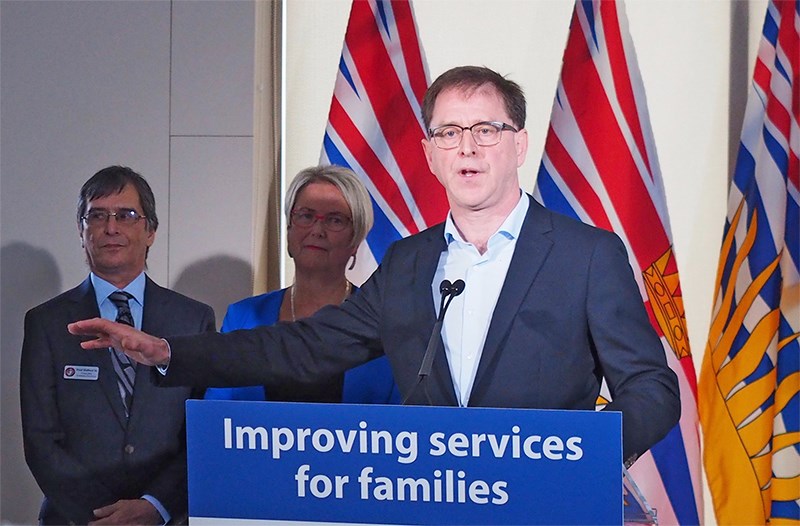Dozens of new doctors, nurses and nurse practitioners will be hired in the Tri-Cities and New Westminster to improve access to health care — especially for pregnant women, frail elderly and people with substance use issues — B.C.'s health minister said Sunday.
At a press conference in Port Moody before an audience of health care officials and politicians, Adrian Dix pledged a recruitment drive to hire 65 health care professionals over the next three years, with an annual funding boost of $12 million once everyone’s in place.
The establishment of primary care networks — three in the Tri-Cities and one in New Westminster— is expected to provide health care to 40,000 people who don’t have a family doctor.
“Having access to a nurse practitioner or family doctor who knows you and is going to provide care over time for you is number one and very important,” Dix told the crowd.
The recruitment drive will see 46 people hired in the Tri-Cities, including dozens of physicians, nurse practitioners (who can diagnose and provide prescriptions) and registered nurses as well as clinical pharmacists.
Kwikwetlem First Nation will also receive access to health care support on reserve in ways that are culturally sensitive.
Under the new system, the Tri-Cities will be broken up into three primary care networks, with physicians having access to services for their patients.
Dix said the creation of primary care networks will fill important gaps.
For example, there are currently thousands of people without a doctor: 32% of women in need of maternity and post natal services, 24% of people with severe mental health and substance abuse challenges and 12% of people who are frail or have chronic illnesses.

“This is the most important announcement I’ll make as minister of health," he said. "It’s a true breakthrough of significance in our primary health care system."
According to a press release, the establishment of primary care networks will ensure mothers and babies born in the region and seniors with complex care needs will be attached to a primary care provider without having to use a walk-in clinic or emergency department.
In addition, people in need of mental health supports will have better access to the right care from the right provider with improved connection to specialized services provided by health authorities.
“By integrating mental health and substance use services into primary care, [we’re saying] mental health and addictions issues are health issues — period,” said Judy Darcy, minister of mental health and addictions, noting that 25% of youths in Fraser Northwest with a severe mental health and substance use diagnosis do not have access to a GP.
Networks will fund up to five full-time clinical counsellors to provide rapid access to mental health and substance abuse services seven days a week, she said.
As well, the new health care officials will work extended hours, including early mornings, evenings and weekends, patients will get same-day service for urgent care, and advice and information may also be provided virtually, such as online or via text and email.
TRI-CITIES BY THE NUMBERS
North Coquitlam, Port Moody, Anmore and Belcarra
3 new GPs, 2 new nurse practitioners, 10 new RNs and 1 clinical pharmacist
Total: 16
Port Coquitlam
2 new GPs, 2 new nurse practitioners, 7.5 new registered nurses, 1 clinical pharmacist
Total 12.5
Southwest and Southeast Coquitlam
4 new GPs, 4 new nurse practitioners, 9 new registered nurses, 1 clinical pharmacist
Total 18
Total for Tri-Cities 46.5 doctors and health care practitioners
Kwikwetlem First Nation
GP support for maternity and sexual health care on-reserve, 1.5 support workers, improved access to home health and public health, services to be provided in a culturally-safe environment
In New Westminster
3 new general practitioners, 4 new nurse practitioners, 5.5 new registered nurses and 1 clinical pharmacist



